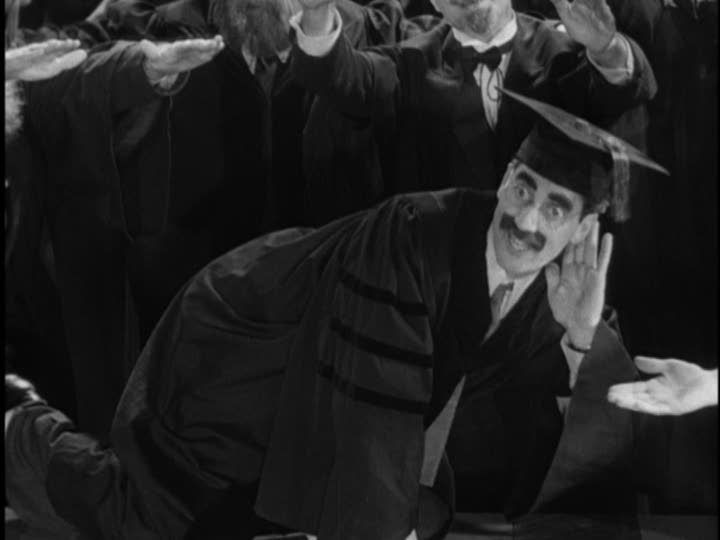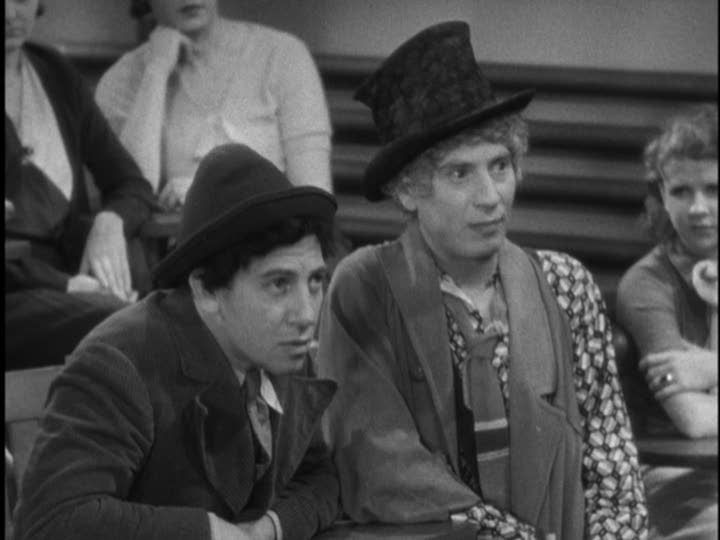
The fourth Marx brothers movie, Horse Feathers, is a typically loopy outing for Groucho, Chico, Harpo and Zeppo. Here, Groucho is Professor Quincy Adams Wagstaff, the new president of Huxley College — not that it matters, since as usual in a Marx film the plot is strictly a secondary concern. The Marx brothers cut to the chase right from the beginning: in the first scene Wagstaff's new presidency is announced, and his introductory speech quickly becomes just a thin excuse for Groucho to keep riffing on all sorts of jokes that have little or no connection to the supposed situation. And he caps it all off with a musical number dedicated to nihilism. "Whatever it is/ I'm against it," he sings, and leads a group of professors in a swirling dance as he leaps up on a table, promising to oppose whatever's normal and ordinary. And they're off, eventually throwing Chico and Harpo into the mix as a pair of goofballs who Wagstaff somehow manages to mistake for football players, bringing them in as ringers to help his school defeat their rivals in the big game.
Director Norman McLeod, who also directed the brothers in Monkey Business, has a good handle on the quartet's manic sense of pacing and their near-perfect interplay with one another. The film moves crisply, careening along with barely a pause for breath. As usual, the brothers take a variety show approach, disregarding the narrative and instead just indulging whatever gags and performances they feel like doing: Harpo doing one of his usual harp performances, Zeppo earnestly wooing a vampy widow (Thelma Todd), or all four of the brothers taking turns putting their own spin on "Everyone Says I Love You," each one offering up their own lyrics, ranging from Zeppo's crooning balladry to Groucho's cynical take on this romantic tune. And of course, the film is packed with the brothers' signature wordplay, particularly between Groucho and Chico, whose verbal dexterity always drives the Marx brothers' films. Chico's the one who informs us that a sturgeon cuts you open when you're sick, or that you cure a haddock with aspirin, or that he used to teach a woman with a false set of teeth but now he teaches a falsetto, or that you can't sleep on a football.
Chico's humor, based on such mispronunciations and verbal puns — like a fast-paced absurdist exchange with Harpo about hogs, pigs, hugs and picks — is a sharp contrast to Groucho's non-sequiturs and one-liners. Whereas Chico and Harpo seem to be perpetually caught in loops of misunderstanding and repetitive silliness, Groucho is constantly reacting, bouncing off of the people and things all around him, riffing on whatever he sees and whatever anyone else says, offering up his own wry commentary on the goofiness of others. He even makes this explicit in this film by actually walking up the camera at one point and directly addressing the audience, telling the viewers that they should go wait out in the theater's lobby during what Groucho deems a tedious section, as Chico plays the piano and sings. That's the way it always seems to work: Groucho's the conspirator with the audience, the one who seems to be winking at all the lunacy going on all around him, even as he gleefully contributes to it. That's why he's perfect as the ostensible authority figure, the university president, who actually winds up destabilizing everything and adding to the general anarchic breakdown of order and stability.

This is the general form of the Marx brothers' humor: infiltrating authority and prestige with their absurdity and their total lack of respect for the rules. In the football game at the end of the film, Harpo gleefully subverts the mechanics of the game at every point. There are countless shaggy-dog sports movies where a group of misfits play a game by their own rules and come out on top, but the Marxes exist somewhere outside that tradition, at right angles even to that conventional depiction of anarchy. Instead, Harpo throws banana peels at the opposing team to make them slip, which for a while helps his team get ahead, but then he just as gleefully throws banana peels under the feet of his own teammate before he can get a touchdown: he's not breaking the rules to win, in other words, but breaking the rules because that's just what he does. It's as innate as breathing, and if sometimes his total disregard for order results in his team coming out ahead, at other times he'll just as obliviously contribute to his own team's setbacks and losses. Harpo, like his brothers, isn't on any team but his own. So throughout the game he repeatedly runs the wrong way, then leaps into a horse-drawn chariot to take him into the end zone, then pulls out multiple footballs to pile up the scores: he's not just breaking the rules, he's acting as if they don't even exist, and indeed they don't seem to. No one ever questions this absurdity; it's just accepted as the natural outgrowth of the brothers' personalities. Nothing behaves as it should when they're around.
At times, the anarchy of the brothers threatens to overwhelm good taste itself, and this film includes an unfortunate moment that betrays a more sinister undercurrent in Groucho's perpetual quipping and joking. In one scene, Thelma Todd's character, a vamp who's trying to seduce the brothers to get ahold of some football plays, speaks in a squeaky baby voice to Groucho, trying to play the part of the weak little femme to trick him into giving up his secrets. Groucho responds by viciously mocking her, telling her that if she keeps talking like that he'll kick her teeth down her throat. It's a startling moment in such a lighthearted film, an ugly burst of violence and nastiness that completely undercuts the supposedly comic tone of the surrounding material. It exposes, too, the darker shadings of Groucho's anarchic persona, which sometimes comes through in his cavalier disregard for propriety and taste — like the dismal way he treats Zeppo, who plays his son here. There are times when Groucho's wit and patter reveal that when you strip away order and stability, some rather ugly things escape along with all the humorous absurdity.
But that's the essence of a Marx brothers film: the breakdown of order. Even the film itself often seems to be breaking down around them. The film was censored and chopped of its bawdiest lines, and in its existing form it's a patchwork assembly that only exacerbates the anarchy and roughness that generally characterized the Marx movies. There are inexplicable cuts and splices in the film, the visible remnants of excised sequences or lines, and this splicing lends a herky-jerky quality to the film at points. In one scene, the ragged cutting makes Groucho seem to move without regard for the laws of physics, leaping across time and space as though he had been cut loose from reality as we know it. Groucho kicks Zeppo out, and as the door slams shut, there's a cut that replaces the slamming door, making the door shut on its own and Zeppo disappear. Before this disjunction can even be processed, the camera is following Groucho as he hunches down and runs across the room, grabbing a lantern from a nearby table. Then he's abruptly at the window, making a quip before another jump cut leads into him running towards the camera. Then he's leaping over a couch to stand next to Thelma Todd, and another jump cut transitions into him hopping into her lap.
This disjunctive editing is a sign of the film's looseness and roughness, its casual lack of concern for continuity or reality. Groucho especially seems to exist somewhere outside of reality as he catapults across the room, the jerky rhythms of the cuts enhancing his naturally stylized movements. As he duck-walks and stutter-steps, the film seems to be syncopating off of Groucho's own inbuilt rhythms, erasing whatever's not strictly necessary, stripping away everything but the essence of Groucho. At one point, he starts to say "where were we" but only gets out the "where" before the rest of the frames are elided, and he seems to instantly leap onto the couch again, answering himself, "oh yeah." That's it in a nutshell: there's only as much as is needed for the gag, and the rest is crudely sliced away. It's an accident of the film's troubled censorship history and the corrupted form in which it has survived, but it only enhances the film's lackadaisical economy. Horse Feathers is a typically nutty, loose-limbed effort from the Marx brothers, capturing their antics at their most hilarious and profane.

7 comments:
Actually I don't find that moment "disjunctive" at all. The Marx Brothers world is that of our own, only more hostestly presented. Violence rules. Lies are the coin of the realm. And Groucho is that most creative of all liars, in that he announces he is about to lie before he ever does so.
As much as I adore Margaret Dumont, I have a sepcial palce in my heart for Thelma Todd. While Dumont posessed no sexuality whatsover, Todd is smokin' hot at all times. Therefore her duels with Groucho find him facing truly powerful adversary.
The sight of her marrying all four brothers in the grnad finale is an unalloyed joy. "Everyone says I love you," indeed.
"Whatever It Is I'm Against It" is now the Republican National Anthem.
This is actually my personal favorite Marx brothers film, and the one that recalls childhood memories with so many Saturday morning viewings. DUCK SOUP may well be the most perfectly orchestrated as opposed to the admittedly anarchic structure of HORSE FEATHERS, which as you rightly assert, is about the 'breakdown of order.' But McLeod recognizes the comic potential here, and he guides some of the boys' most deliciously insane set pieces and one-liners. Hence, it really is a funnier film than MONKEY BUSINESS, easily, and it's one of three Marx masterpieces with the aforementioned DUCK SOUP and A NIGHT AT THE OPERA.
This film brings to mind a justly famous Three Stooges short titled "Violent is the Word For Curly' which features Moe, Larry and Curly as college professors, who replace the real ones, and turn a college campus into unending mayhem.
Exceedingly cogent and inspired essay here.
I love love love the Marx Brothers, and this is my favorite of their films. They were so witty and talented, AND I love Thelma Todd in the movie as well. Thanks for the post!
I'm surprised John Stewart hasn't yet done a montage of no-shouting Republicans set to "Whatever It Is I'm Against It" — it's a perfect song for them these days.
Sam, I do prefer Duck Soup, which probably has the brothers' best and most famous set pieces, but this one's certainly pretty close.
Meredith, glad you enjoyed the review!
There's a current of meanness in Groucho that I notice more every time I rewatch the Paramount films, especially when it's directed toward Chico. There's more than comic exasperation going on in some of their scenes, and a sort of spite in his ritual dismissals of Chico's piano scenes. It's still funny, buy it makes me wonder about the family dynamics.
And "I'm Against It" is too good to be wasted on the Republicans, though maybe Ron Paul could do it justice.
Groucho is mean and dismissive of everyone, not just Chico.
That's the essence of his charm.
I agree with David. Groucho's got a real nasty streak to him that's hardly limited to his responses to Chico. I saw it in this film in the way he threatens to kick Thelma Todd's teeth in. His humor often verges over into plain mean-spirited misanthropy; in this same film, he's pretty nasty to Zeppo, who's supposed to be playing his son.
Post a Comment